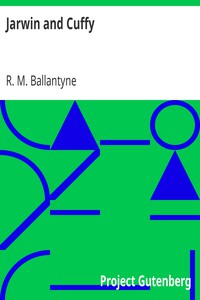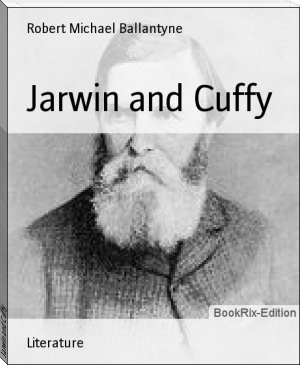Jarwin and Cuffy by R. M. Ballantyne (i read a book TXT) 📗

- Author: R. M. Ballantyne
Book online «Jarwin and Cuffy by R. M. Ballantyne (i read a book TXT) 📗». Author R. M. Ballantyne
While he stood irresolute, the wail was repeated, and, this time, there was a melancholy sort of “bow-wow” mingled with it, that sent the blood careering through his veins like wildfire. Fatigue and hunger were forgotten. Shouting the name of his dog, he bounded forward, and would infallibly have plunged head-foremost into another pit, at the bottom of which Cuffy lay, had not that wise creature uttered a sudden bark of joy, which checked his master on the very brink.
“Hallo! Cuff, is that you, my doggie?”
“Bow, wow, wow!” exclaimed Cuffy in tones which there could be no mistaking, although the broken twigs and herbage which covered the mouth of the pit muffled them a good deal, and accounted for the strangeness of the creature’s howls when heard at a distance.
“Why, where ever have ’ee got yourself into?” said Jarwin, going down on his knees and groping carefully about the opening of the pit. “I do believe you’ve bin an’ got into a trap o’ some sort. The savages must have been here before us, doggie, and made more than one of ’em, for I’ve just comed out o’ one myself. Hallo! there, I’m into another!” he exclaimed as the treacherous bank gave way, and he slipped in headlong, with a dire crash, almost smothering Cuffy in his fall.
Fortunately, no damage, beyond a few scratches, resulted either to dog or man, and in a few minutes more both stood upon firm ground.
It would be vain, reader to attempt to give you in detail all that John Jarwin said and did on that great occasion, as he sat there on the ground caressing his dog as if it had been his own child. We leave it to your imagination!
When he had expended the first burst of feeling, he got up, and was about to retrace his steps, when he observed some bones lying near him. On examination, these proved to be the skeleton of a man. At first Jarwin thought it must be that of a native; but he was startled to find among the dust on which the skeleton lay several brass buttons with anchors on them. That he stood beside the remains of a brother seaman, who had probably been cast on that island, as he himself had been, seemed very evident, and the thought filled him with strange depressing emotions. As it was by that time too dark to make further investigations, he left the place, intending to return next day; and, going as cautiously as possible out of the wood, returned to his abode, where he kindled a fire, gave Cuffy some food, and prepared some for himself; but before he had tasted that food another of the shivering fits seized him. A strange feeling of being very ill, and a peculiar wandering of his mind, induced him to throw himself on his couch. The prolonged strain to which body and mind had been subjected had proved too much for him, and before morning he was stricken with a raging fever.
For several days the sailor lay tossing in helpless misery in his bower, without food or fire. Indeed he could not have eaten even if food had been offered him, and as to fire, there was heat enough in his veins, poor fellow! to more than counterbalance the want of that.
During part of the time he became delirious, and raved about home and sea-life and old companions in a way that evidently quite alarmed Cuffy, for that sagacious terrier approached his master with caution, with his tail between his legs, and a pitiful, earnest gaze, that was quite touching. This was partly owing to the fact that Jarwin had several times patted him with such painful violence as to astonish and render him doubtful of the affection displayed by such caresses. Jarwin also recurred at these times to his tobacco and beer, and apparently suffered a good deal from dreams about those luxuries. In his ravings he often told Cuffy to fill a pipe for him, and advised him to look sharp about it, and he frequently reproached some of his old comrades for not passing the beer. Fortunately the fountain was close at hand, and he often slaked his burning thirst at it. He also thought frequently of the skeleton in the thicket, and sometimes raved with an expression of horror about being left to die alone on a desert island.
By degrees the fever reached its climax, and then left him almost dead. For a whole day and night he lay so absolutely helpless that it cost him an effort to open his eyes, and he looked so ill that the poor dog began to whine piteously over him, but the day after that a sensation of hunger induced him to make an effort to rouse up. He tried to raise his head—it felt as if made of lead.
“Hallo! Cuffy, somethin’ wrong I suspect!”
It was the first time for many days that Jarwin had spoken in his natural tones. The effect on the dog was instantaneous and powerful. It sprang up, and wagged its expressive tail with something of the energy of former times; licked the sick man’s face and hands; whined and barked intelligently; ran away in little bursts, as if it had resolved to undertake a journey off-hand, but came back in a few seconds, and in many other ways indicated its intense delight at finding that Jarwin was “himself again.”
But alas! Jarwin was not quite himself yet, and Cuffy, after his first ebullition, sat looking in surprise at the invalid, as he strove to turn on his side, and reach out his heavy hand and skinny arm towards a few scraps of the last meal he had cooked before being struck down. Cuffy, after eating the portion of that meal that suited his taste, had left the remnants there as being unworthy of notice, and catered for himself among the dead fish cast up on the beach. Although lying within a yard of his couch, Jarwin had the greatest difficulty in reaching the food; and when he did at length succeed in grasping it, he fell back on his couch, and lay for a long time as if dead. Soon, however, he recovered, and, with a feeling of gratitude such as he had never before experienced, began to gnaw the hard morsels.
“I’m in a bad way, Cuff,” he said, after satisfying the first cravings of hunger.
Cuffy gave a responsive wag with his tail, and cocked his ears for more.
“Hows’ever, seems to me that I’ve got the turn; let’s be thankful for that, my doggie. Wonder how long I’ve bin ill. Months mayhap. Don’t think I could have come to be sitch a skeleton in a short time. Ha! that minds me o’ the skeleton in the wood. Have ’ee seed it, Cuff, since I found ’ee there? Well, I must eat and drink too, if I would keep the skin on my skeleton. Wish you had hands, doggie, for I’m greatly in need o’ help just now. But you’re a comfort, anyhow, even though you hain’t got no hands. I should have died without you, my doggie—you cheer me up, d’ee see, and when it’s nigh low water with a man, it don’t take much to make him slip his cable. The want of a kind look at this here time, Cuffy, would have sent me adrift, I do believe.”
It must not be supposed that all this was spoken fluently. It came slowly, by fits and starts, with a long pause at the end of each sentence, and with many a sigh between, expressive of extreme weakness.
“I wish I had a drink, Cuffy,” said the invalid after a long pause, turning a longing look towards the spring, which welled up pleasantly close to the opening of the hut. “Ay, that’s all very well in its way, but bow-wowin’ an’ waggin’ yer tail won’t fetch me a can o’ water. Hows’ever, it’s o’ no manner o’ use wishin’. ‘Never say die.’ Here goes.”
So saying, he began slowly and painfully, but with unyielding perseverance, to push, and draw, and hitch himself, while lying at full length, towards the spring, which he reached at last so exhausted, that he had barely put his lips to it and swallowed a mouthful, when his head dropped, and he almost fainted. He was within an ace of being drowned, but with a violent effort he drew his face out of the spring, and lay there in a half unconscious condition for some time, with the clear cool water playing about his temples. Reviving in a little time, he took another sip, and then crawled back to his couch. Immediately he fell into a profound slumber, from which Cuffy strove in vain to awaken him; therefore, like a sagacious dog, he lay down at his master’s side and joined him in repose.
From that hour Jarwin began to mend rapidly. In a few days he was able to walk about with the aid of a stick. In a few weeks he felt somewhat like his former self, and soon after that, he was able to ascend to the top of the island, and resume his watch for a passing sail. But the first few hours of his watch beside the old flagstaff convinced him that his hopes would, in all probability, be doomed to disappointment, and that he would soon fall back into a state of apathy, from which he might perhaps be unable to rouse himself, in which case his fate would certainly be that of the poor sailor whose remains he had that day buried in the pit near to which they had been discovered. He resolved, therefore, to give up watching altogether, and to devote all his energies in future to devising some plan of escape from the island, but when he bent his mind to this task he felt a deep sinking of the heart, for he had no implements wherewith to construct a boat or canoe.
Suddenly it occurred to him, for the first time in his life, that he ought, in this extremity, to pray to God for help. He was, as we have said, a straightforward man, prompt to act as well as ready to conceive. He fell on his knees at once, humbly confessed his sin in depending so entirely on himself in time past, and earnestly asked help and guidance for the future. His prayer was not long—neither was the publican’s—but it was effectual. He arose with feelings of strong resolution and confidence, which appeared to himself quite unaccountable, for he had not, as yet, conceived any new idea or method as to escaping from the island. Instead of setting his mind to work, as he had intended, he could not help dwelling on the fact that he had never before deliberately asked help from his Maker, and this raised a train of self-condemnatory thoughts which occupied him the remainder of that day. At night he prayed again before laying down to rest.
Next morning he rose like a giant refreshed, and, after a plunge in the sea and a hearty breakfast, set out with Cuffy for a meditative walk.
Great were the thoughts that swelled the seaman’s broad chest during that walk, and numerous, as well





Comments (0)